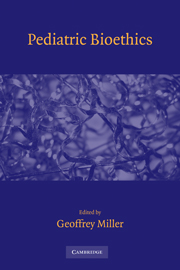11 - Disorders of Sex Development
Published online by Cambridge University Press: 07 May 2010
Summary
In this chapter, we explore ethical issues in the treatment of children who have disorders of sex development. This term, “disorders of sex development” (DSD), has recently been adopted by medical professionals as a replacement for irregularly employed umbrella terms for congenital sex anomalies, including “intersex” and “(pseudo)hermaphroditism.” The term covers “congenital conditions in which development of chromosomal, gonadal, oranatomical sex is atypical.” Thus, it includes such conditions as Klinefelter syndrome, Turner syndrome, androgeninsensitivity syndrome (AIS), gonadal dysgenesis, and various manifestations of atypical genital development, to name just a few. Some types of DSD are diagnosed prenatally or at birth; some involve external (i.e., visible) sex atypicality; some involve an increased likelihood that children will grow up to feel a gender identity different from the gender assigned at birth. Despite this heterogeneity in diagnosis and clinical presentation, all types of DSD raise concerns among clinicians and parents about gender, fertility, and sexual function and hold the potential for producing disabling shame andsecrecy. These concerns are ultimately both clinical and ethical matters, as we show here.
We begin this chapter with this discussion of terminology not only to clarify which conditions are under consideration here, but also because, in DSD clinical care, nomenclature implicates ethical considerations. Unlike outdated, shame-inducing terms like those based on the root “hermaphrodite,” the term “disorders of sex development” seems to predispose clinicians to openly disclose to their patients the true nature of their conditions, which we take to be an ethical good. Avoiding vague, imprecise terms (and concepts) like “pseudo-hermaphrodite” and “intersex” encourages a focus on precise medical diagnoses and evidence-based medical care for individual patients.
Keywords
- Type
- Chapter
- Information
- Pediatric Bioethics , pp. 149 - 162Publisher: Cambridge University PressPrint publication year: 2009

